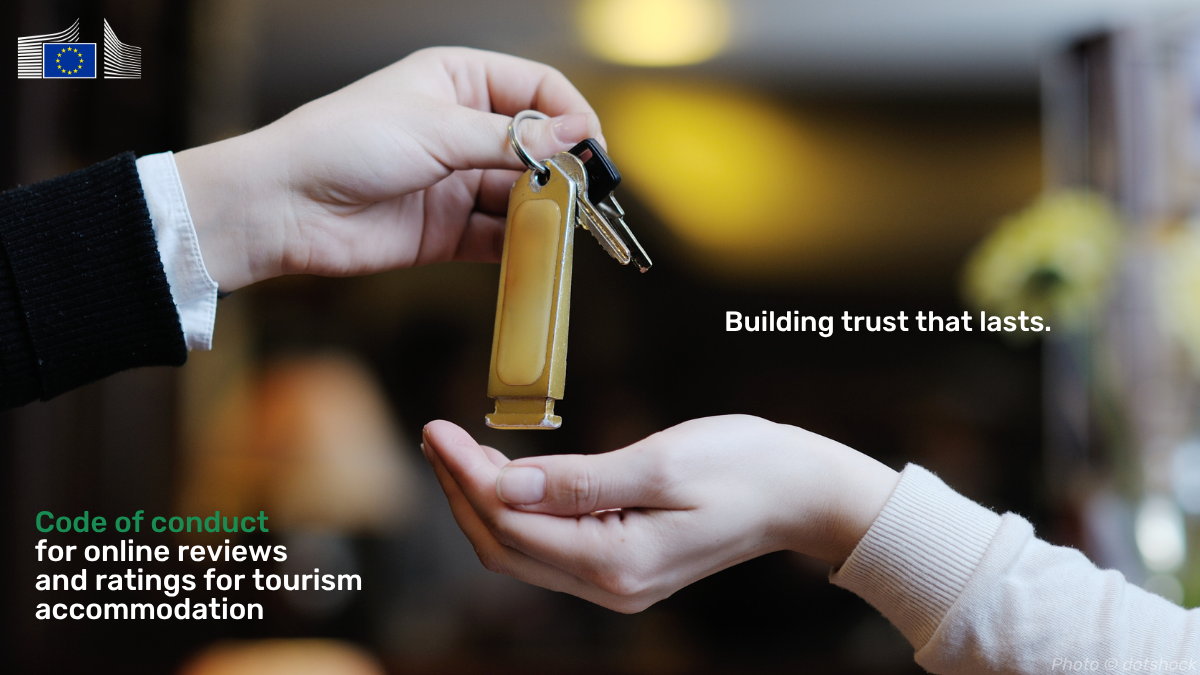
Shaping a More Transparent Future for Online Reviews in Tourist Accommodation
In October 2024, representatives from the tourism sector took part in a key roundtable meeting in Brussels. The invitation was extended by the European Commission's Directorate-General for Internal Market, Industry, Entrepreneurship and SMEs (GROW), with a clear and significant goal: to co-create a pan-European Code of Conduct for online reviews and ratings of tourist accommodation.
This initiative was recognised as an excellent opportunity for the tourism industry, particularly for hotels, which are directly impacted by the landscape of online reviews. Consequently, representatives from Athenian hotels, together with Develop Athens – Athens’ DMMO – through This is Athens – Convention & Visitors Bureau, travelled to Brussels to contribute actively to this process.
The meeting in Brussels brought together a diverse group of stakeholders from across the European Union. Participants included representatives from consumer associations, hotel chains, public Destination Management Organizations (DMOs), and major Online Travel Agents. A common thread among all attendees was their participation in the initial phase of the initiative, which involved completing a comprehensive questionnaire distributed by the Commission, followed by open and constructive dialogue.

The Code of Conduct was officially signed, establishing a new benchmark for the industry. It is noteworthy that from Greece, institutional bodies such as Develop Athens SA and the Ministry of Tourism-Greece are also among the first signatories.
What Does the New Code of Conduct Entail?
This Code is not merely a theoretical document but a practical tool designed to enhance transparency and reliability in online reviews, benefiting both consumers and businesses. It is founded on the principle of shared responsibility among all stakeholders to combat fake reviews and promote authentic guest experiences.
A key feature of the Code is its establishment of clear definitions for crucial terms, including:
- Fake Reviews: Defined as reviews that do not reflect a firsthand, independent user experience but are written with the express purpose of upgrading or downgrading an accommodation provider (e.g., through review boosting or review bombing).
- Incentivised Reviews: Reviews produced in exchange for compensation or remuneration, such as monetary payment, discounts, or other rewards.
- Illegal Content: Refers to content that does not comply with EU or Member State law, such as illegal hate speech, commercial scams, or intellectual property rights infringements.
Beyond these definitions, the Code outlines specific principles and commitments for different stakeholder groups.
For Accommodation Providers, key commitments include:
- To refrain from generating fake reviews or engaging third parties to create or post them.
- To avoid using disproportionate or conditional incentives that could lead to biased reviews.
- To utilize features that allow for responding to reviews, viewing negative feedback as an opportunity for improvement and dialogue.
- To collaborate with platforms in flagging suspicious or fake reviews.
- To ensure that information about their accommodation is regularly updated on all platforms.
Correspondingly, Online Platforms (such as OTAs and search engines) commit to:
- Taking reasonable and proportionate steps to verify that reviews originate from an actual consumer experience.
- Providing clear and accessible processes for both providers and consumers to flag fake, policy-violating, or illegal reviews.
- Establishing channels that allow accommodation providers to publicly respond to reviews.
- Clearly distinguishing between official star ratings and user-generated ratings.
- Being transparent about how their overall rating systems are calculated.
The implementation and evolution of the Code will be overseen by a Stakeholder Network. This network will convene regularly to discuss challenges, share best practices, and ensure the Code remains a dynamic and effective resource for the industry.
This participation in this European initiative was a strategic step to ensure the voice of the Athenian hospitality sector is heard at the highest level, contributing to a framework that will strengthen trust and safeguard the integrity of the tourism ecosystem. The Code of Conduct is open to operators of tourism accommodation, associations, online platforms, consumer associations and other active stakeholders.
By signing the Code, you commit to taking action to ensure genuine online reviews and ratings.
Want to get involved? Contact: [email protected]
Stay Connected
To keep up with the latest news, initiatives, and success stories from This is Athens - CVB, follow our journey on social media.
Find us on LinkedIn & Facebook for up-to-date news and developments.
